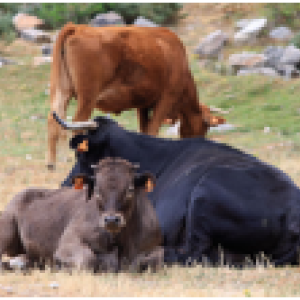
This open access article from Chalmers University, Sweden, argues that unless we reduce our consumption of meat and dairy, world temperatures will continue to rise and we will be unable to meet the goal of keeping global temperatures from rising more than 2˚C.
The authors argue that cutting greenhouse gas emissions from energy use and transport is not enough if we are to meet our global climate change targets. If no action is taken, for example by reducing meat and cheese consumption, the study warns that nitrous oxide emissions from livestock may double by 2070.
One of the study authors, Stefan Wirsenius, will soon provide a blog post for the FCRN where he will discuss the paper more in detail. (NB: if you’d like to write a blog for the FCRN focusing on your work or on a topic of interest to you, do get in touch.)
Abstract
For agriculture, there are three major options for mitigating greenhouse gas (GHG) emissions: 1) productivity improvements, particularly in the livestock sector; 2) dedicated technical mitigation measures; and 3) human dietary changes. The aim of the paper is to estimate long-term agricultural GHG emissions, under different mitigation scenarios, and to relate them to the emissions space compatible with the 2 °C temperature target. Our estimates include emissions up to 2070 from agricultural soils, manure management, enteric fermentation and paddy rice fields, and are based on IPCC Tier 2 methodology. We find that baseline agricultural CO2-equivalent emissions (using Global Warming Potentials with a 100 year time horizon) will be approximately 13 Gton CO2eq/year in 2070, compared to 7.1 Gton CO2eq/year 2000. However, if faster growth in livestock productivity is combined with dedicated technical mitigation measures, emissions may be kept to 7.7 Gton CO2eq/year in 2070. If structural changes in human diets are included, emissions may be reduced further, to 3–5 Gton CO2eq/year in 2070. The total annual emissions for meeting the 2 °C target with a chance above 50 % is in the order of 13 Gton CO2eq/year or less in 2070, for all sectors combined. We conclude that reduced ruminant meat and dairy consumption will be indispensable for reaching the 2 °C target with a high probability, unless unprecedented advances in technology take place.
Citation
Hedenus, F., Wirsenius, S., Johansson D. J. A., 2014, The importance of reduced meat and dairy consumption for meeting stringent climate change targets, Climatic Change,
Read the article here. For related coverage of the article see here and here.
Read more about greenhouse gas emissions relate to livestock and meat here. You can also search the website for information related to 'meat consumption + mitigation'.







Post a new comment »